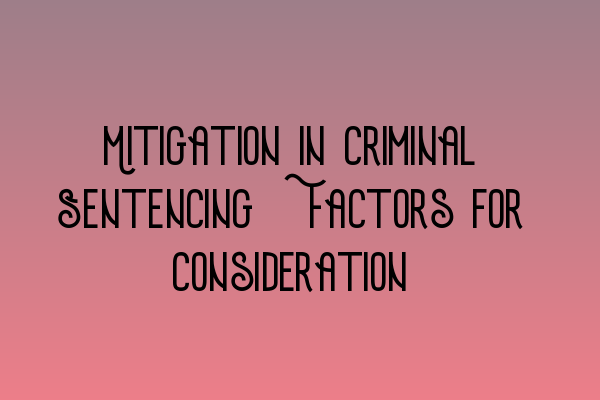Mitigation in Criminal Sentencing: Factors for Consideration
When it comes to criminal sentencing, mitigation plays a crucial role in determining the appropriate punishment for offenders. Mitigation refers to the process of taking into account certain factors that may reduce the severity of the sentence imposed on an individual convicted of a criminal offense. In the United Kingdom, mitigation is an essential aspect of criminal law and practice, ensuring that sentencing remains fair and just.
Why is Mitigation Important?
Mitigation recognizes that criminal behavior is not always black and white. It acknowledges that circumstances and personal factors can influence an individual’s actions, leading them down the wrong path. By considering these factors, the court aims to strike a balance between punishment and rehabilitation, taking into account an offender’s unique circumstances and potential for reform.
Key Factors for Consideration in Mitigation
Understanding the factors that contribute to mitigation can be essential in building a strong defense strategy. The following are some key considerations that can impact the gravity of the sentence:
1. Personal Circumstances: The court takes into account an offender’s personal circumstances, such as age, mental health, and any prior convictions. These factors can provide insight into the individual’s character and their potential for rehabilitation.
2. Remorse and Rehabilitation: Demonstrating genuine remorse and a commitment to change can significantly influence the sentence imposed. Showing efforts towards rehabilitation, such as attending therapy or completing educational programs, can mitigate the severity of the punishment.
3. Co-operation with Authorities: Cooperation with the police or other law enforcement agencies during the investigation, including providing substantial assistance in solving other crimes, can be a powerful mitigating factor that can lead to a reduced sentence.
4. Timely Guilty Plea: A timely guilty plea indicates an acceptance of responsibility, cooperation with the court, and saves valuable resources, reducing the burden on the criminal justice system. Courts often reward such pleas with reduced sentences.
5. Cultural and Social Factors: Mitigation also takes into account an offender’s cultural and social background. Factors such as a history of abuse, deprivation, or gang-related pressures can provide a contextual understanding of the offender’s behavior.
6. Impact on Dependents: If an offender has dependents, such as young children or elderly parents, sentencing considerations may include assessing the impact of their absence on the family unit. This factor aims to maintain the welfare and stability of innocent parties involved.
7. Provocation or Self-defense: In cases where an offender acts in response to provocation or reasonably perceives a threat to themselves or others’ safety, these factors can be considered in mitigation.
8. Cooperation during Trial: Cooperation demonstrated during the trial process, such as providing evidence in favor of the prosecution or helping uncover the truth, can be a significant mitigating factor.
The Role of Legal Representation
Engaging the services of a skilled criminal defense solicitor is crucial in ensuring that all relevant mitigating factors are adequately presented to the court. A qualified solicitor understands the intricacies of the law and can effectively navigate the complexities of the legal system.
By working closely with their clients, solicitors can gather evidence, interview witnesses, and build a strong defense strategy that encompasses all relevant mitigation factors. Their expertise and experience can greatly increase the chances of a favorable outcome during sentencing.
In Conclusion
Mitigation forms an integral part of the criminal sentencing process in the UK. It acknowledges that every case is unique and that personal circumstances and factors should be taken into account when determining an appropriate sentence. By considering the various facets of mitigation, the court ensures that justice is not only served but also tempered with fairness and compassion.
If you find yourself facing criminal charges, it is essential to consult with a reputable criminal defense solicitor who can guide you through the legal process, advocate for your rights, and present strong mitigation on your behalf. Remember, mitigation can make a significant difference in the outcome of your case, so it’s crucial to have expert guidance every step of the way.
